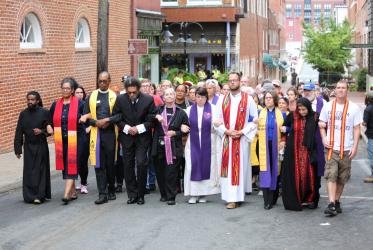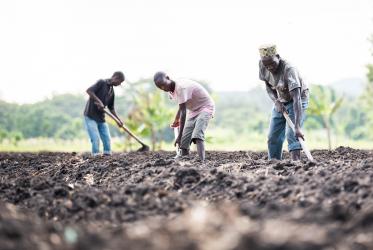Participants from across the continents heard on 15 December how deep injustices are at play as communities grapple with the impacts of colonial history on present-day societies, alongside the intersections of economic interests, market forces, the commercialization of food, and frequently unsustainable farming practices.
Rev. Dr Angelique Walker-Smith, senior associate for Pan African and Orthodox Church Engagement, Bread for the World, and a member of the WCC central committee, led with reflection and prayers, tying contemporary land injustices and inaccessibility of adequate nutritional food to communities across the world to the legacies of the racist slave trade, imperialism and colonization.
Global examples of racism, land and food
Dr Betty Ruth Lozano Lerma, director of research at the Fundación Universitaria Bautista (Unibautista), Colombia, spoke from Cali about Afro-descended people who make up around 10% of her country's population, more than five million people at least.
She noted how the armed conflict in Colombia has forcibly displaced communities of people of African descent from their lands and therefore their capacity to produce their own food.
“This population is dependent on the land for their survival, but many people have had been displaced to the cities,” she said.
Through their sharing, participants sought to consolidate resources – analytical, advocacy, and practical – and understand and expose the effects of the combined forces of food, climate, and racial injustice.
Dr Mervyn Abrahams from the Pietermaritzburg Economic Justice and Dignity Group in South Africa said his country is "perhaps a global example of how these three areas intersect, both from the perspective of racism rooted in an ideology and very much connected to white supremacy."
Black people in South Africa have been historically disconnected from their history and sense of identity, dispossessed of their land, and forced to work in mines and towns.
"In the South African context, we see food insecurity resulting from lingering poverty. So just one example, 25% of black children today under the age of five are stunted, which means they are cognitively impaired," he said, with lack of access to adequate nutritional food as an underlying cause.
Dr Fransina Yoteni, a WCC central committee member from the Evangelical Christian Church in Tanah Papua, West Papua, Indonesia, went on to share the flagrant abuse of the dignity and rights experienced by the Papuan people. The violence and dispossession perpetuated on the Papuan people tears them away for their lands and their livelihoods, and the hunger for food cannot be separated from the thirst for justice and peace, she urged.
Food and the spiritual connection
Rev. Chebon Kernell as executive director of the Native American Comprehensive Plan for the United Methodist Church, USA, representing indigenous peoples of North America said, "what we need to begin to understand is that this displacement, this dispossession goes back centuries."
Kernell highlighted a distinction between food security and food sovereignty: "when we think of food sovereignty, this is one concept that we are almost, as the indigenous peoples of North America, on the cusp of losing or forgetting. You might think that efforts of assimilation and colonization have almost come to fruition because they've almost taken those things from us."
"We've recognized this has happened. We're doing everything in our power. Because just the concept of food sovereignty, which is a little bit different than food security, has an understanding behind it, that talks about a spirituality, about a connection," he reflected.
The webinar closed with a theological reflection by Rev. Adrian Reid from Barbados who said “there is scope in the Scriptures for us to ensure equitable access to land and food for all people of God.”
“When God created Adam and Eve and placed them in a garden, there was no difference and they interacted with God. However, when they disobeyed the instruction not to eat of the tree of knowledge, their disobedience introduced difference and they sought to avoid God,” Reid reflected.
“Racism, land injustice and food insecurity are all results of the difference that was introduced, not by God, but by human beings. Over generations, human beings have used difference to discriminate and exclude, but God’s plan was that we will always be the same,” he concluded.







